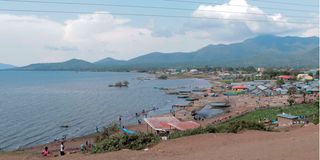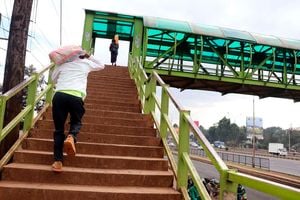Where condom dispensers are empty but reckless sex habits are in full swing

An aerial view of Sindo Town in Homa Bay County on September 1. The town hosts one of the largest fisherfolk populations and is among areas hit by a shortage of condoms. Inset: An empty condom dispenser at the Homa Bay Police Station on September 7.
What you need to know:
- Condom dispensers in Homa Bay have been empty for four months
- The shortage is putting the lives of locals at risk
- Homa Bay is one of the counties with the highest HIV prevalence
“I am a single man who temporarily cohabits with different women,” admits Lenny Ochieng (not his real name), a fisherman and resident of Sindo, Homa Bay County.
But Ochieng is a worried man. The condom dispensers at the Sindo Gateway Beach have been empty for the past four months.
As a result, the fisherman has been unable to access the commodity due to cut supplies. They now live in fear of contracting HIV and other sexually transmitted infections (STIs).
“We received our last condom supply in April. Since then, our dispensers have remained empty. The commodity is also not available in public hospitals,” said Mr Ochieng.
He explains that people have to buy the products. However, shops are always closed at night when he needs them.
“For years, the commodity has always been made available at the dispensers and can be accessed during the day and night. But this is no longer the case,” says the fisherman.
But Mr Ochieng is not the only person affected by the lack of free condoms.
Fishermen living around the busy beaches of Homa Bay County are staring at a possibility HIV/Aids spreading faster due to condom shortage.
According to the fishermen, most of the non-government organisations that often supply them with condoms withdrew their services months ago.
Healthy Nation conducted a spot-check and witnessed empty dispensers along all the three active beaches in Sindo.
The small town in Suba South Sub-county is mostly inhabited by non-natives whose main economic activity is fish mongering and fishing.
According to the residents, a number of individuals here are not in permanent marriages but instead practise a cohabiting behaviour known as “puk iyier”, a Luo word loosely translated to describe a use-and-dump relationship.
Here, the interested partner will play husband or wife to an individual depending on their financial status.
For women, the marriage may last for a week, months or a year depending on the man’s financial status.
“When the man, who in most cases is a fisherman, runs out of cash or can no longer have a good harvest from the lake, the lady will leave for a more financially endowed man,” says Ms Nancy Auma, a fishmonger.
The fishermen, on the other hand, will be at liberty to leave the relationship for women of their choice any time.
While the fisherfolk community has been identified as a HIV/Aids key population, the practice makes them even more susceptible to the viral disease.
According to the Sindo Gate Beach Management Unit Chairman John Onyango, the HIV transmission rate there is largely dependent on the availability of condoms.
He revealed that his office is always handling cases especially reported by women following breakups with their temporary partners.
“Here, a single fisherman or lady can infect up to 1,000 individuals, thus the need for proper HIV prevention and management,” said Mr Onyango.
“Most men and women we have here are either unmarried, widowed or left their families in search of greener pastures.”
Mr Onyango said condoms have also been unavailable in public hospitals and institutions, where they have been present in the past.
“HIV remains a low concern among the fisherfolk. Most of them now argue that one can take the antiretroviral drugs and still lead a healthy life,” he shared.
Mr Linstone Ochieng, also a fisherman, said that the situation is not any different at the beaches in Mbita where he works.
“It is always easier to access the condoms at the beach dispensers especially when in need of them during the night hours,” said Mr Ochieng, adding that most fishermen are reckless and may not consider purchasing the product.
The shortage has left the health experts in Homa Bay worried about a possible spike of infections in an event of more delays.
Setback
Dr Wilis Omuoyo, the county HIV and STI coordinator, said the shortage is likely to affect the gains made against HIV/Aids management and prevention.
While attributing the shortage to hiccups at the national level, he said the crisis has persisted for at least two months, with condom dispensers in public places like bars left empty.
“Homa Bay does not procure condoms but waits for supply from the central government. We were promised that another consignment will be sent before they are distributed to different outlets across the county, but have not received any,” he said.
The shortage is a major setback to Homa Bay, one of the counties with the highest HIV prevalence.
According to the 2020 data, the HIV prevalence in the county was 18.7 percent, down from 26 percent in 2014.
One of the reasons behind a drop in the new infections is the constant supply of condoms in the health facilities and public places.
Some of the steps the devolved unit took in collaboration with non-governmental organisations to lower the risk of transmission included encouraging use of condoms, voluntary medical male circumcision, and the use of pre-exposure prophylaxis drugs.
“The interventions target the high-risk population, including fishermen along the shores of Lake Victoria where HIV infection is higher due to the risky sexual behaviours,” Dr Omuoyo said.
“We will continue with distribution (of condoms) the moment another consignment is delivered,” he added.






